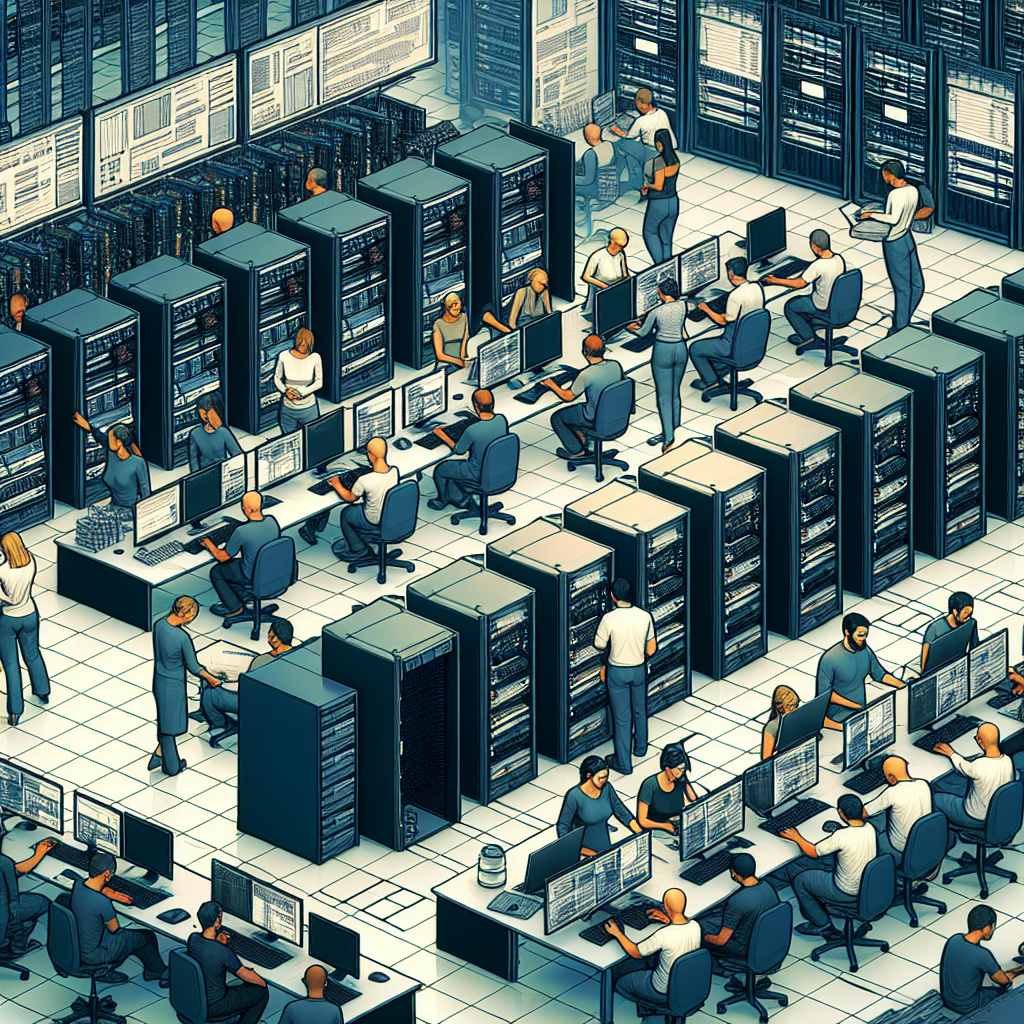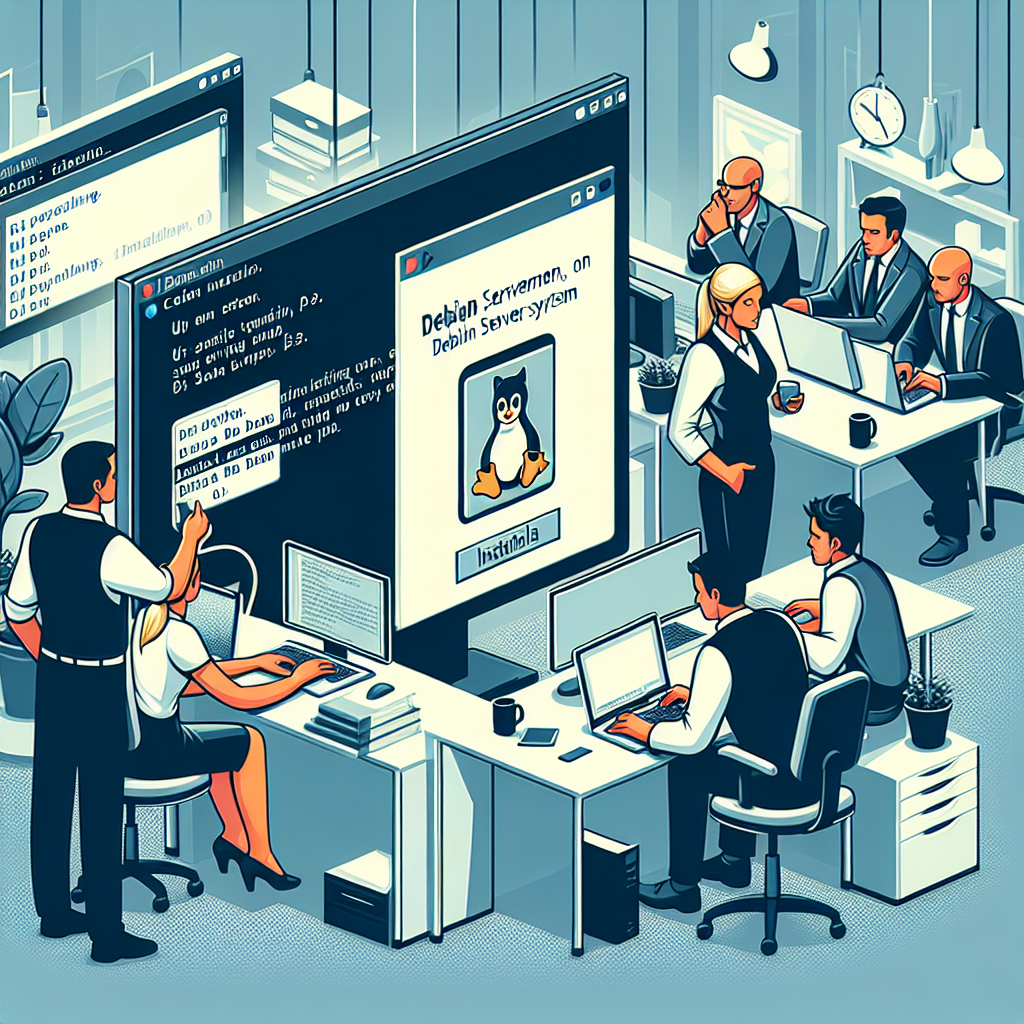What is Debian for? Exploring Its Essential Role in Modern Server Environments
Ever wondered what is Debian for? ⭐ This powerful operating system serves as the backbone for countless applications and websites across the globe. Debian is not just any operating system; it is a Debian server that excels in reliability, security, and flexibility, making it a favored choice among businesses looking to meet their IT needs efficiently.
The Significance of Debian in Todays Tech Landscape
In an age where uptime and performance are crucial, understanding the question what is a Debian server? becomes essential. Debians robust architecture ensures that your applications run smoothly. It offers a solid foundation—partly due to its extensive community support that continually improves its features and security updates.
- ⭐ Stability: Debian is renowned for its long release cycles, providing a stable environment for critical applications.
- ⭐ Security: Regular updates and a rigorous security policy make Debian one of the safest options available.
- ⭐ Community Support: Its vast developer community ensures that you can find solutions to most issues quickly.
Real-World Applications: What Can Be Done with a Debian Server?
So, what can be done with a Debian server? Here are some real-world applications:
- ⭐ Web Hosting: Many websites use Debian servers due to their dependability and speed—allowing your business to maintain a professional online presence.
- ⭐ Database Management: With tools like MySQL and PostgreSQL, managing data becomes streamlined and efficient.
- ⭐ Development Environment: Developers often use Debian for building and testing applications before pushing them live.
For example, a mid-sized e-commerce company initially struggled with uptime issues and slow loading times. After switching to a Debian server, they experienced a 40% increase in site speed and reduced downtime by over 50%. This improvement not only enhanced user experience but also boosted sales! ⭐
Steps for Installation and Configuration of Debian on a Server
You might be thinking, “It sounds great, but how do I get started with the installation and configuration of Debian on a server?” Fear not! Here’s a quick step-by-step guide:
- ⭐️ Download Debian ISO: Begin by downloading the latest Debian ISO file from their official website.
- ⚙️ Create Installation Media: Use a USB drive or CD/DVD to create an installation medium.
- ⭐ Boot from Installation Media: Plug in your USB or insert the CD/DVD, and reboot your server.
- ⭐ Follow Installation Prompts: Choose your language, region, and install type (typically standard is advisable).
- ⭐ Configure Security Settings: Set up your initial security settings to safeguard your server.
Completing these steps typically takes less than an hour, depending on your hardware and internet speed! ⭐
Why Choose Us for Your Debian Needs?
At webmaster.md, we pride ourselves on being the go-to company for Debian support in the country. With over 20 years of experience and a team of professional specialists, we provide a full spectrum of services—from software development to technical support. Theres no need to juggle multiple companies when you can get everything in one place! ⭐ Contact Arsenii, our dedicated customer relations manager, at +373 601 066 66 to find the perfect solution for your business.
Why wait? Sign up for our services today by visiting webmaster.md. Your IT infrastructure deserves the best, and with our expertise, we’ll ensure you get just that! ⭐
Frequently Asked Questions
- What is Debian? Debian is an operating system that serves as a stable and secure platform for servers.
- How does a Debian server differ from others? Its focus is on stability, security, and extensive community support.
- Why choose Debian for business applications? It offers unmatched reliability and a huge array of packages.
- Can Debian run on old hardware? Yes! Debian is highly versatile and can run on various hardware configurations.
- What kind of support do you offer for Debian? We provide comprehensive support from installation to ongoing management.
- Is it difficult to switch to a Debian server? Not at all! Our team can guide you through a seamless transition.
- How secure is Debian? It has a robust security policy and receives frequent updates.
- Can Debian be used for cloud applications? Absolutely! Many cloud services use Debian for its flexibility.
- What is the best use case for a Debian server? Hosting websites and managing databases are top use cases.
- How do I get started with Debian? Contact us for installation services and support at webmaster.md.
What is a Debian Server? Understanding Its Advantages for Your Business
When searching for a reliable platform for your IT needs, you might be wondering, what is a Debian server? ⭐ Essentially, a Debian server is an instance of the Debian operating system, optimized for server tasks such as web hosting, file sharing, and application management. With its foundation built on stability and security, it’s increasingly recognized as a go-to solution for businesses of all sizes.
Key Features of a Debian Server
A Debian server offers a variety of features that can significantly enhance your business operations. Here are some of the standout characteristics:
- ⭐️ Stability: Debian is known for its reliable performance, which reduces downtime—vital for businesses that rely on constant web access.
- ⭐ Security: With regular updates from a dedicated community, Debian servers are one of the safest choices for storing sensitive data.
- ⭐ Flexibility: Supporting a wide range of software packages, Debian allows businesses to customize their environments to meet specific needs.
- ⭐ Active Community: Debians vast community means immediate access to help, tools, and resources to resolve issues without delay.
Business Advantages of Using a Debian Server
Are you still pondering on what is a Debian server?? Let’s dig into its business advantages!
- ⭐ Cost-Effective: With no licensing fees and a plethora of available resources, businesses save significantly on both initial investment and ongoing costs.
- ⚖️ Scalability: Debian allows easy scaling as your business grows, ensuring that your server infrastructure can adapt to demand without a hitch.
- ⭐ Performance: Known for efficient resource management, Debian ensures that your server can handle heavy loads effectively, which is crucial during peak business hours.
For instance, a medium-sized tech startup had challenges with application performance using their old server system. After migrating to a Debian server, they reported a 50% improvement in application speed and overall responsiveness, leading to increased customer satisfaction and higher retention rates! ⭐
Common Uses for Debian Servers in Business
Curious about what a Debian server can do for you? Here are some common use cases:
- ⭐ Web Hosting: Many online businesses and services utilize Debian for fast and secure web hosting due to its robust architecture.
- ⭐ Data Storage: Use Debian to manage databases safely and efficiently for applications that require quick data access.
- ⭐ Email Services: Set up email servers on Debian to ensure secure and reliable communication for your organization.
Expert Recommendations: Making the Most of Your Debian Server
Our team at webmaster.md has over 20 years of experience, and we’re here to guide you through maximizing the benefits of your Debian server. Here are some expert tips you can implement:
If you’re ready to explore the world of Debian servers, our dedicated team, led by Arsenii, is just a call away at +373 601 066 66. With our professional specialists, we provide everything from installation to technical support, making sure your business runs smoothly. Don’t hesitate—visit webmaster.md to sign up for our tailored solutions today! ⭐
Frequently Asked Questions
- What makes a Debian server different from other servers? Debian servers prioritize stability and security, coupled with extensive community support.
- Is it suitable for small businesses? Absolutely! Its cost-effectiveness makes it ideal for small to medium-sized enterprises.
- What applications run best on a Debian server? Web hosting, database management, and email services are commonly run on Debian servers.
- How often should I update my Debian server? Regularly, particularly after security updates are released.
- Can I customize Debian according to my business needs? Yes, Debian is highly flexible and can be tailored to suit a range of applications.
- How easy is it to scale a Debian server? Very easy! Debians architecture allows for straightforward scaling as your business grows.
- Is technical support available for Debian users? Yes, our team at webmaster.md offers comprehensive support for all your Debian needs.
- Is there a risk in using an open-source system like Debian? As long as you follow best practices and keep it updated, it is extremely secure.
- Can I migrate from another server to a Debian server? Absolutely, and our team can help you through a seamless transition.
- What cost savings can I expect with a Debian server? You can save significantly on licensing and support costs while benefiting from robust performance.
What Can Be Done with a Debian Server? Real-World Applications and Success Stories
If youre still wondering what can be done with a Debian server? youre in for a treat! This robust operating system isn’t just for tech enthusiasts—its a powerful tool that businesses can leverage in multiple ways to enhance efficiency and productivity. ⭐ Let’s explore some real-world applications and success stories that showcase the versatility of Debian servers!
Common Applications of Debian Servers
Debian servers can serve a wide array of purposes. Here’s a breakdown of their most common applications:
- ⭐️ Web Hosting: Debian is often used to host websites due to its unparalleled stability and security features. Businesses appreciate its flexibility to run a variety of content management systems such as WordPress, Joomla, and Drupal.
- ⭐ File Storage: Companies use Debian servers to create file-sharing systems that allow employees to collaborate securely on documents and media rather than using unreliable cloud services.
- ⭐ Database Management: With support for databases like MySQL, PostgreSQL, and MongoDB, Debian is a go-to for applications that require efficient data retrieval and storage.
- ⭐ Email Services: Deploying your own email server using Debian ensures full control over your communication channels, enhancing security and data privacy.
Success Stories: How Businesses Thrive with Debian
Let’s dive deeper into some inspiring stories of businesses that improved their operations and outcomes by utilizing Debian servers.
Case Study 1: E-commerce Success
A local e-commerce platform faced challenges related to slow loading times and frequent downtime on their previous hosting solution. After migrating to a Debian server, they observed a whopping 60% improvement in site speed. ⭐ Their conversion rates shot up by 25%, dramatically increasing their yearly revenue. This transformation not only boosted their online presence but also resulted in improved customer satisfaction. Customers are less likely to abandon their shopping carts when pages load quickly!
A healthcare provider was struggling with compliance regarding patient data security on their existing platform. By moving to a Debian server for data management, they could implement strict security protocols and data encryption more effectively. ⭐ As a result, they successfully passed all compliance audits with flying colors, ensuring both the brand’s reputation and patient trust in the process. Now, they confidently manage sensitive information without compromising on security.
Case Study 3: Streamlined Collaboration
A growing digital marketing agency relied heavily on smooth collaboration between team members. By setting up a Debian server for internal file-sharing and project management tools, they were able to reduce email clutter and boost productivity significantly. The switch led to a 40% increase in project turnaround times, allowing them to take on more clients without sacrificing quality. ⭐ This enabled them to grow their business significantly while keeping operational costs in check!
Innovative Uses for Your Debian Server
The possibilities with a Debian server are vast. Here are some innovative uses you may not have considered:
- ⭐ Game Servers: Host multiplayer gaming servers on Debian for a reliable and enjoyable gaming experience.
- ⭐️ Virtual Private Network (VPN): Use Debian to create a secure VPN to protect your online activity and remote access needs.
- ⭐ Media Streaming: Set up a media streaming server to share audio or video content across devices easily.
Getting Started with Your Debian Server
Now that you know what can be done with a Debian server, are you feeling inspired? If you’re ready to take the plunge or need expert advice, our team at webmaster.md is here to help! We have over 20 years of experience assisting businesses like yours with consultation, setup, and ongoing support. Contact our customer relations manager, Arsenii, at +373 601 066 66 or visit webmaster.md to get started today! ⭐️
Frequently Asked Questions
- What can Debian servers be used for? They are versatile and can handle web hosting, file storage, email services, and much more.
- How secure is a Debian server for sensitive data? Very secure! Debian’s architecture allows you to implement advanced security protocols.
- Can I run a database on a Debian server? Yes! Debian supports multiple database systems for efficient data management.
- Is it possible to host my own email on a Debian server? Absolutely! By using Debian, you can create your own secure email infrastructure.
- What kinds of businesses benefit from Debian servers? Businesses of all sizes—from startups to enterprises—can find value in implementing Debian servers.
- Can a Debian server be integrated with cloud services? Yes! Debian can work alongside cloud services for hybrid solutions.
- What technical skills are needed to manage a Debian server? Basic Linux knowledge is beneficial, but our team can assist with all aspects if needed.
- How do I ensure my Debian server is up to date? Regular updates and patching strategies should be employed to maintain security and performance.
- Is Debian a good option for an online store? Definitely! Its stability and security make it an excellent choice for e-commerce platforms.
- How can I get started with a Debian server? Contact us at webmaster.md to discuss your needs and how we can assist you!
Installation and Configuration of Debian on a Server: A Step-by-Step Guide for Optimal Performance
Are you ready to unleash the power of a Debian server for your business? ⭐ Whether you are a tech enthusiast or a business owner, understanding the installation and configuration of Debian on a server is essential to optimize performance and reliability. Here’s a comprehensive step-by-step guide to help you get started! ⭐️
Step 1: Prepare for Installation
Before diving into installation, you need to prepare your environment:
- ⭐️ Hardware Requirements: Ensure your hardware meets Debians minimum requirements. This typically includes a 1 GHz processor, 512 MB RAM (1 GB recommended), and at least 10 GB of hard drive space.
- ⭐ Download Debian: Go to the official Debian website to download the latest stable release ISO file appropriate for your architecture.
- ⭐ Create Installation Media: Use a USB flash drive or burn the ISO to a DVD for booting. Tools like Rufus or balenaEtcher can help create bootable USB drives easily.
Step 2: Boot from Installation Media
With your installation media ready:
- ⭐ Insert the USB Stick or DVD: Plug in your USB drive or insert the DVD into your server.
- ⭐ Reboot Your Machine: Start or restart your server, ensuring it boots from the installation media. You may need to access your BIOS/UEFI settings to change the boot order.
Step 3: Install Debian
Once booted from the installation media, follow these steps:
- ⭐️ Select Installation Type: You can choose between a Graphical or Text-based installer. The graphical installer is user-friendly for beginners.
- ⭐ Choose Your Language and Location: Select your preferred language, then choose a location that best suits your needs.
- ⭐️ Partitioning: Choose whether you want to use guided partitioning (recommended for beginners) or manual partitioning. For most users, guided partitioning will suffice.
- ⭐ Set Up User and Password: Create a root password (which is optional for some configurations) and set up a regular user with sudo privileges.
Step 4: Configure the Base System
After installing the base system, you will proceed with setting up the following:
- ⭐ Network Configuration: The installer will attempt to configure your network automatically. Make sure to set a static IP if the server will be accessed frequently.
- ⭐ Install Software Packages: Select software packages that suit your needs: SSH server is essential for remote management, while web server packages are great for hosting.
Step 5: Finishing the Installation
Once the base system is set up, it’s time to complete the installation:
- ⭐ Install the GRUB Bootloader: Allow the installer to set up the GRUB bootloader, ensuring your system can boot successfully.
- ✅ Remove the Installation Media: When prompted, remove the USB or DVD and reboot your server.
Step 6: Post-Installation Configuration
After successfully booting into your new Debian server, perform the following configurations to optimize performance:
- ⭐ Update the System: Open a terminal and run
sudo apt update && sudo apt upgrade to ensure your system is up to date. - ⭐️ Configure Firewall: Implement a firewall using
ufw or iptables to secure your server from unauthorized access. - ⭐️ Install Additional Packages: Depending on your needs, consider installing packages for web servers like Apache or Nginx, database servers like MySQL or PostgreSQL, and development tools.
Step 7: Monitor and Maintain Your Debian Server
To maintain optimal performance, make monitoring a priority:
- ⭐ Set Up Monitoring Tools: Integrate server monitoring tools like Nagios, Munin, or Zabbix to keep tabs on system performance and health.
- ⭐️ Regular Backups: Implement a regular backup strategy to secure important data and configurations.
Expert Help at Your Fingertips
If this sounds overwhelming, don’t worry! At webmaster.md, we have a team of professional specialists ready to assist you. With over 20 years of experience, we offer comprehensive installation and configuration services tailored to your business needs. Get in touch with our customer relations manager, Arsenii, at +373 601 066 66 or visit webmaster.md for more information. Your optimal server setup is just a call away! ⭐
Frequently Asked Questions
- What is the minimum requirement for a Debian server? A minimum of a 1 GHz processor, 512 MB RAM, and 10 GB disk space.
- Can I use Debian for web hosting? Yes! Debian is an excellent choice for web hosting due to its stability and performance.
- What software can I install on a Debian server? You can install a variety of software, including web servers (Apache/Nginx), databases (MySQL/PostgreSQL), and much more.
- Is it safe to leave my server unmonitored? No! Regular monitoring can help prevent issues before they escalate.
- How often should I update my Debian server? Regularly, especially for security updates. Aim for weekly or bi-weekly checks.
- What should I do if my server crashes? Take a backup if you have one, then consult a professional for recovery options.
- Can I get professional help with installation? Yes, our team at webmaster.md can help you with installation and configuration!
- Is Debian suitable for beginners? Yes! With our guidance, even beginners can successfully navigate the installation process.
- How much time does the installation typically take? It usually takes about 30 minutes to an hour, depending on your setup.
- What is GRUB? GRUB is the bootloader that allows you to manage and choose which operating systems to boot.






